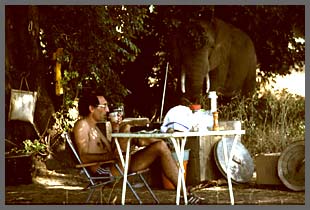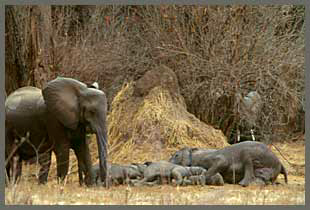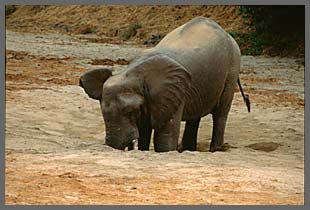 |
Elephants often visit my camp |
 |
Elephants sleeping |
 |
Elephant digging for water |
Elephants have been everywhere in Africa, big herds roamed the
grasslands but they also adapted to life in forests and deserts.
Respected by the emerging hominoid, he has accompanied man on his
evolutionary path, a link that might well be imbedded in our genetic
memory. Certainly few who get to know the Elephant will not be impressed
by his intelligence and touched by a family life that we can only
admire with envy. It might be for these reasons that the demise of
the species raises passions far beyond our general concern for the
ecological disasters that surround us.
Many of the Elephant's life
cycles are close to ours. They have a similar life span and the same
extended period to maturity, giving time to learn. As with humans
and other primates their babies have a relatively underdeveloped
brain at birth with minimal innate knowledge. The brain relies on
learning and is open to complex social development and the formation
of culture. Similar to humans the average age in which elephants
become sexually mature is reached at about thirteen. A cow typically
produces a single calf and will continue to reproduce until mid-life.
She experiences a long post-reproductive phase that is similar to
the human menopause. As humans, elephants can suffer from cardiovascular
problems and from the age-related arthritis.
The typical family unit
consists of females with their young. It is closely bonded by kinship,
affiliation, experience, great loyalty and affection and is led by
the most experienced female taking the role of matriarch. When males
reach maturity, they leave the family to join other bulls in bachelor
groups. Dominant
males rejoin the family units during mating.
In past relocation schemes,
youngsters have often been moved to new areas and the adults were
left behind, because it is so much easier to transport juveniles
than an adult. However young elephants that were brought up in separation
from the parents and without the guidance from adults often became
delinquent. Raising an orphan baby is for the same reasons not simply
a matter of providing it with the daily 10 or more liters of milk.
The family is crucial in the life of the growing elephant, the tender
care and love bestowed on their young may serve us as a guide on
the care of own children.
Elephant communicate over long distances,
they do so at very low frequency sounds that are ideal for long-range
communication. We can sometimes hear their "rumble" but
most frequencies are below the range of human hearing (an excellent
book
"Silent Thunder: In the Presence of Elephants" by Katy Payne offers
an insight on that subject). Elephants may journey together kilometers
apart for days, keeping in touch by sound - language actually. Research
and observation has proven that elephants are indeed capable of
many complex functions of thought and feeling, their emotional intelligence
and high order of consciousness becomes evident to those who observe
these magnificent animals in the wild.












